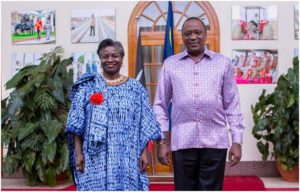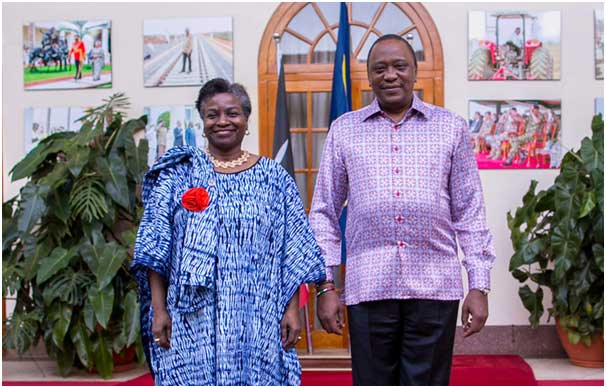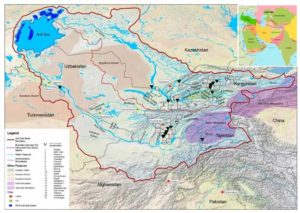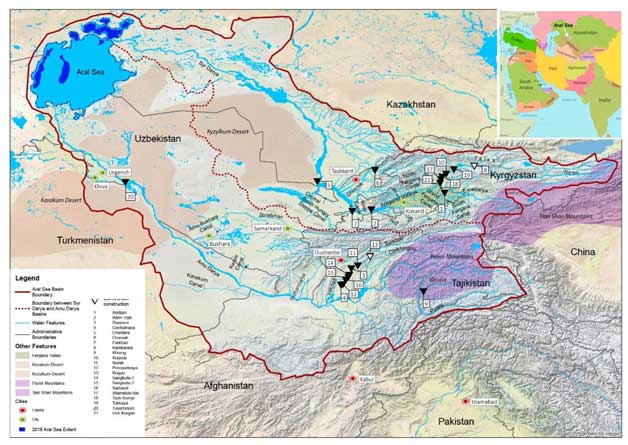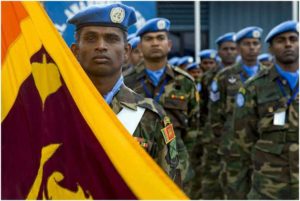
Armed Conflicts, Civil Society, Featured, Global, Global Governance, Headlines, Humanitarian Emergencies, IPS UN: Inside the Glasshouse, TerraViva United Nations
Ambassador Kshenuka Senewiratne is Permanent Representative of Sri Lanka to the United Nations
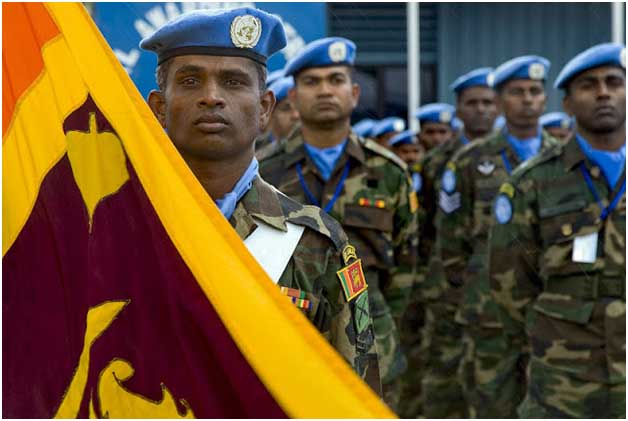
Sri Lankan Peacekeeping troops
– Given the political, economic and social exigencies of contemporary peacekeeping, it is important that the Department of Political and Peacebuilding Affairs (DPPA) remains engaged in the process.
To achieve durable peace, there must be cooperation and coordination between the United Nation’s peacebuilding architecture, its peacekeeping operations and the respective member states.
As peacekeepers are being deployed in increasingly dangerous environments, the UN faces multi-dimensional challenges in a constantly changing landscape. In order to address these new challenges, the management methods of peace operations within the UN must strive to be fair and equitable, and field operations must adapt and acquire specialized capabilities.
It is fundamental to the values of this august body, that the Secretariat adheres to accepted procedures, in order for the work of the United Nations not serve misplaced political interests of a few. This could affect the proper deployment of capable and qualified peacekeepers, thus jeopardizing the respective operations.
In this regard, Sri Lanka is compelled to refer to a matter of questionable procedure, having experienced unjust treatment at the hand of the Secretariat, in terms of the Department of Peace Operations (DPO).
This situation arose when an unilateral decision was made and conveyed by the DPO, on the adjustment of Sri Lanka’s contribution to a peacekeeping operation. This violated the provision of the related MoU, thereby bringing into question the adopted procedure, which has been flawed from the very beginning.
The DPO sought to link its decision of not replacing a contingent of peacekeepers on rotation to an internal appointment made by Sri Lanka as a sovereign right, thereby challenging the Head of State of a member country. Further the nominations of the replacing peacekeeping contingent had been made well before that of the high appointment in question to the DPO.
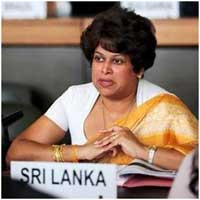
Ambassador Kshenuka Senewiratne
Hence the linking of the appointment of the commander of the Army to that of the peacekeepers is an anomalous situation. The UN which prides itself on humanitarian work in this instance chose to practice its tenets in the breach, by overlooking the denial of the identified peacekeepers added aspirations once nominated for the respective operation.
The flawed procedure began with the decision to adjust a Sri Lankan peacekeeping contingent and the reasons for such punitive action, being originally communicated verbally. A request was made by Sri Lanka for all these details to be informed formally in writing.
Surprisingly only the troop details were thus communicated, and the DPO chose instead to formally make a statement to the media regarding the reason; while to date Sri Lanka is yet to receive the requested information in writing.
Furthermore, though USG Lacroix even yesterday assured that every single area of Peacekeeping is rule-based, it is disconcerting that DPO chose to violate Article 15 of the related MOU, by not consulting with Sri Lanka prior to the decision being taken thus presenting a fait accompli to the UN member state. Such action has unfortunately and plausibly culminated in the creation of a trust deficit concerning DPO.
Furthermore, this manner of treatment could lead to precedent setting which member states must seek to arrest, lest the practice becomes systemized only to entrench politicization within the UN system.
It also opens the window for the pernicious violation of the principles of the UN Charter on non-interference and sovereignty of States which must be adhered to not only in relation to Peacekeeping mandates, but also in troop deployment.
It is imperative for the Secretariat, to hold sacrosanct the fact that the UN system is member state led, and discharge of its responsibilities in that context, while upholding equal treatment. This will also avoid the Secretariat contributing to the possible erosion of multilateralism.
Furthermore, while appreciating the Secretary General’s assurance to meet obligations to Member States providing troops and equipment as promptly as possible based on the availability of funds, Sri Lanka also urges the Secretariat to fulfill its financial obligations vis-a-vis peacekeepers when identified to be replaced, at the point of their repatriation.
Additionally, it is important to ensure a predictive system of payment on all dues concerning peacekeeping operations.
With the paucity of funding, peacekeeping mandates should take into account the complexities of their current operations and be clear and operable. The UN should consult TPCCs and recipient states in developing and renewing the mandate, as without those inputs, the operations may not reflect real needs.
It is also important to address the causes of instability and conflict, and peace operations must seek to build local information networks, in order to protect civilians and non-combatants. Additionally, peacekeepers should be deployed in support of robust diplomatic efforts.
At the very heart of these mandates, must be the protection of children and the most vulnerable among the community. The images of the suffering of children in conflict especially as recently seen, are particularly unacceptable.
The UN apparatus must seek coherence among its agencies in order to address this issue. As we mark 20 years of UN Security Council Resolution 1325(2000), it is important to make every effort at national, regional and global levels to include women in peacekeeping and peacebuilding.
In order to address the disproportionate and unique impact of armed conflict on women, gender perspectives must be incorporated in all UN peace and security efforts. Women are received differently by the local population and are often successful in building relationships within those communities.
In this regard it is worthy to note that Sri Lanka is currently in the process of developing by October 2020 an Action Plan on Women Peace and Security for the implementation of Resolution 1325 with the support of the Government of Japan.
Sri Lanka has demonstrated its wholehearted commitment to the elimination of Sexual Exploitation and Abuse and its zero-tolerance policy by signing the Secretary General’s related Voluntary Compact, joining his Circle of Leadership and making contributions to the Trust Fund to help such victims.
The country has also adopted several best practices including a stringent vetting procedure for selecting peacekeeping troops with the involvement of the Office of the High Commissioner for Human Rights and the Independent National Human Rights Commission of Sri Lanka.
Sri Lanka’s involvement with UN peacekeeping has covered six decades. The country commenced contributing to UN Peacekeeping Operations in 1956 initially with Military Observers. Since then a total of 22,587 peacekeepers have rotated within the Missions. Today, contributions by Sri Lanka to UN Peacekeeping stand at 657 personnel and in field support with equipment and a hospital.
Currently Sri Lanka maintains a Level II Hospital and a fleet of Combat Support Helicopters in South Sudan (UNMISS), a fleet of Helicopters in Central Africa (MINUSCA), an Infantry Company each in Lebanon (UNIFIL) and Mali (MINUSMA) and Military Observers and Staff Officers in most Missions.
It is worth noting that operating under trying circumstances, Sri Lanka’s troops – in particular under MINUSMA, the helicopter units operating in UNMISS and MINUSCA – have come in for high praise from senior officials of the UN system.
Our troops are highly professional and have been part of many endeavours of the United Nations to maintain peace and security around the world. Sri Lanka has considerable experience in combating violent unruly elements, and providing humanitarian assistance and disaster relief.
Sri Lankan peacekeepers continue to work in difficult terrain and having acquired multiple skills while facing complex situations, and possess excellent operational experience and expertise, having ended nearly three decades of separatist terrorism domestically.
Finally, over the years, hundreds of thousands of military personnel, as well as tens of thousands of UN police and other civilians from more than 120 countries, have participated in UN peacekeeping operations.
Many, including Sri Lankan peacekeepers, have paid the ultimate sacrifice while serving under the UN flag. Sri Lanka pays the highest tribute to them, and with grateful thanks and humility, recognize and commend their achievements.

